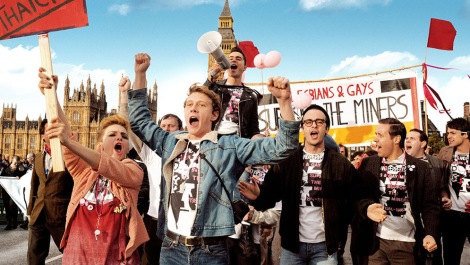Why you can trust GamesRadar+
It’s fair to say that the relationship between the gay community and the mining one hasn’t been over-explored in popular cinema. Yet the real-life bond that formed between these two groups in the ’80s is precisely what motors this crowd-pleasing Brit-flick, an uplifting portrait of working-class solidarity that explores territory previously excavated by the likes of Brassed Off and Billy Elliot while still feeling as fresh as a newly uncovered coal seam.
It’s June 1984, three months into the miners’ strike. In London, one enterprising gay activist (Ben Schnetzer) has a notion to raise cash for the National Union of Miners (NUM), recognising in Scargill’s pit workers another oppressed minority at the sharp end of Thatcher’s policies. Rebuffed by the union’s leaders, the LGSM (Lesbians and Gays Support the Miners) decide to reach out to a colliery community directly. Their efforts take them to Onllwyn, a village in Wales whose prejudices throw another obstacle into the mix…
Inspired by a true story, Pride actually tells several. Front and centre is a tale of pronounced culture clash, the arrival of Schnetzer’s Mark, his long-suffering lieutenant Mike ( This Is England ’s Joe Gilgun) and the rest of their gang prompting every reaction from uneasy acceptance to disgusted outrage. Yet Stephen Beresford’s witty and moving script also makes space for a plethora of subplots that, while not always developed to their full potential, help give the film as a whole a richer, more profound resonance.
OK, so you might have expected to find a closeted teen (George MacKay) who takes up the banner behind his parents’ backs, or a flamboyant thespian (Dominic West) who breaks down barriers by unleashing the power of disco. Less anticipated, though, are the embittered Welsh outcast ( Sherlock ’s Andrew Scott) who knows only too well what prejudice awaits his cohorts in the Valleys, or the way the escalating Aids crisis sows seeds of division within this team of bucket-rattling do-gooders.
In Onllwyn, too, we get stories aplenty: the humble housewife (Jessica Gunning) who finds a vocation in the cause, or the poetry-quoting shut-in (Bill Nighy) who experiences a new lease of life. And there is farce as well, much of it coming from a clutch of curious oldies, led by Imelda Staunton’s Hefina, who take to the leather scene like the proverbial ducks to water.
If there’s a heart to the film, though, it’s Dai (Paddy Considine), a union rep with the wit and foresight to see that a friend in need is a friend indeed. His thank you speech to a room of sceptical clubbers is an early highpoint, rivalled later by a rendition of ‘Bread And Roses’ – performed by one-time The Voice hopeful Bronwen Lewis – that is sadder than a pit pony stuck down a mineshaft.
That such emotional grace notes are sounded by a director with only one feature film credit to his name makes Pride ’s accomplishments all the more remarkable. Yet Matthew Warchus is hardly a novice, his numerous achievements in theatre ( Art , Matilda The Musical , God Of Carnage ) more than compensating for one lacklustre venture behind the camera ( Simpatico , his underwhelming 1999 adap of Sam Shepard’s play).
His second reveals him to be as adept at juggling big casts as he is at marshalling large set-pieces, be they in a working man’s club in the Dulais Valley, a Bronski Beat gig in Camden or a demonstration outside the Houses of Parliament. Perhaps his most important decision here, however, is to downplay the schmaltz, his film nimbly avoiding the layers of sentimentality that could have easily coated the entire enterprise like coal dust.
Admittedly, Beresford’s screenplay is noticeably less sure-footed when it comes to its lesbian characters, most of whom make Viz ’s Millie Tant seem sophisticated by comparison. Indeed, there are times when the likes of Steph (Faye Marsay), Zoe (Jessie Cave) and Stella (Karina Fernandez) are simply employed as punchlines: objects of curiosity to be quizzed and probed by Menna Trussler’s Gwen, an ageing busybody craving insights into the Sapphic lifestyle. (“What I was told about lesbians can’t be true, can it? That you’re all vegetarians?”) They may have a presence but they don’t have a voice, or at least one that gets heard. For all Pride ’s preaching about equality and acceptance, it’s invariably a bloke who steps up to the microphone.
Still, this is a minor cavil in a film with so much generosity of spirit, one that celebrates what brings us together rather than the stuff that pulls us apart. It’s also one that could conceivably do wonders for the Welsh tourist board, so lovingly is the country photographed by DoP Tat Radcliffe.
Neil Smith is a freelance film critic who has written for several publications, including Total Film. His bylines can be found at the BBC, Film 4 Independent, Uncut Magazine, SFX, Heat Magazine, Popcorn, and more.



